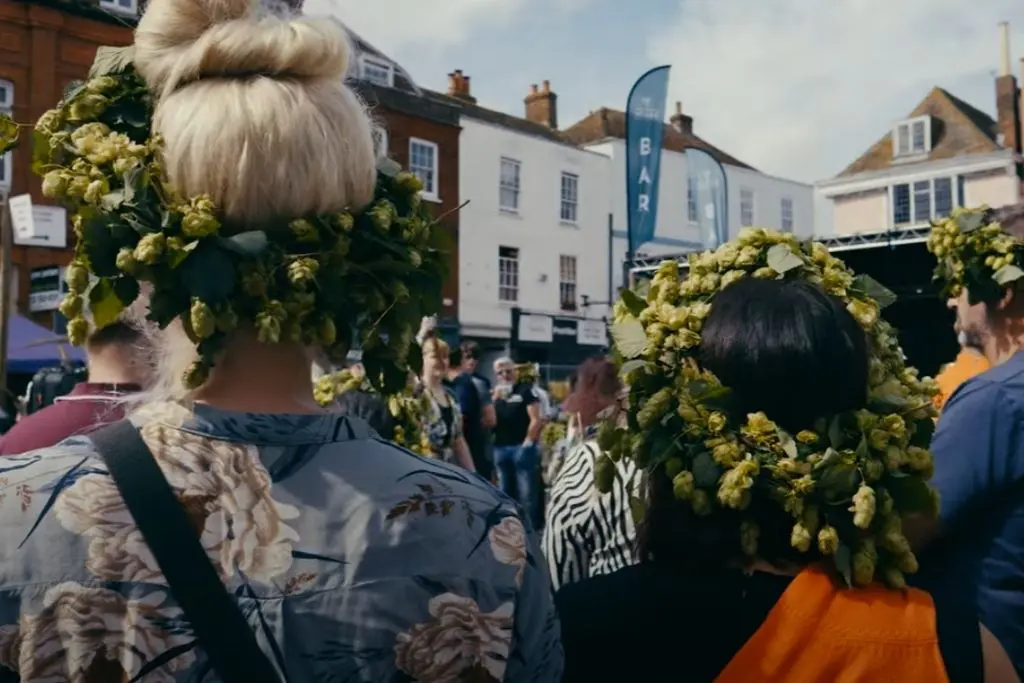FAVERSHAM, KENT – Thousands of visitors are expected to descend on Faversham this weekend as the town’s celebrated Hop Festival returns. The event, which celebrates ale, music, and the area’s farming history, will take place on Saturday, 30 August, and Sunday, 31 August. Organisers expect thousands of visitors to come to the town.

The festival marks a proud local tradition. In the past, families would travel from London to Kent for the annual hop harvest. This year’s event aims to help local businesses and bring life back to the town centre. For many, it’s more than just a festival; it’s a way to celebrate Faversham’s deep connection to farming and brewing.
Music and Old Traditions
The festival’s programme is a blend of modern entertainment and old traditions. More than 70 bands and acts will perform across five main stages, providing a continuous flow of music. The stages, including the Shepherd Neame Brewery Stage and the Market Place Stage, will showcase a wide range of genres, from blues and rock to folk and traditional sounds.
The festivities begin with the traditional Hop Blessing ceremony, a powerful reminder of the event’s farming roots. This is followed by a series of colourful parades featuring Morris dancers, brass bands, and historic vehicles winding through the town’s streets. These processions are a central part of the festival, connecting attendees to Faversham’s past. For families, there are many other things to do. Dedicated areas will feature street performers, magic shows, and puppet theatre, ensuring the festival is welcoming for visitors of all ages.
The festival also features a large market with stalls selling crafts and local produce. Visitors can browse a variety of handmade gifts, unique home goods, and other treasures from local artisans. Food stalls will serve up street food from different cultures, offering everything from classic hot dogs and burgers to more exotic dishes. This variety of offerings helps create a festival atmosphere that extends beyond the main music stages.
Shepherd Neame’s Important Role
As Britain’s oldest brewery, Shepherd Neame plays a key role in the festival’s success. It is a main sponsor. The brewery’s nine pubs in Faversham will serve many award-winning beers.
The brewery also makes a special beer for the event called Hop Pocket. It is made using fresh hops picked just before brewing. This process shows the town’s special link to the hop plant.
The Chief Executive of Shepherd Neame, Jonathan Neame, has commented on the festival’s value. In a statement on the brewery’s website, he said: “Faversham Hop Festival is a fantastic celebration of our hop heritage in Kent, and Shepherd Neame has been proud to support the event since its beginning.” He added that the event gives “a fantastic boost to our town, attracting thousands over the weekend.”
Help for the Local Economy
The Faversham Hop Festival is a major boost for the town’s economy. The event brings in an estimated 40,000 visitors over two days. This number is based on past records and media reports. All these people spend money on hotels, food, and local crafts. This is very important for the town’s small businesses.
The festival is run by Community Heritage Events Ltd, a non-profit company. Its official website says the event costs over £100,000 to put on. The festival is free for everyone to attend. Its funding comes from company sponsors and public donations. The team of local volunteers is a big reason the event is successful.
A Lasting Tradition
The festival has grown a lot since it started in 1990. It began as a small community event to honour the local hop-picking tradition. Now it is one of Europe’s largest free festivals. This shows the strong support from the community and how much people love the theme. For locals, the festival is a source of town pride. It’s a way to celebrate a history that is central to Faversham’s identity.
The hop plant itself is a powerful symbol of Faversham’s history. The town was once the centre of hop-growing in England. The festival acts like a living museum, keeping alive the memory of the hop-pickers and the culture that grew around the harvest.



